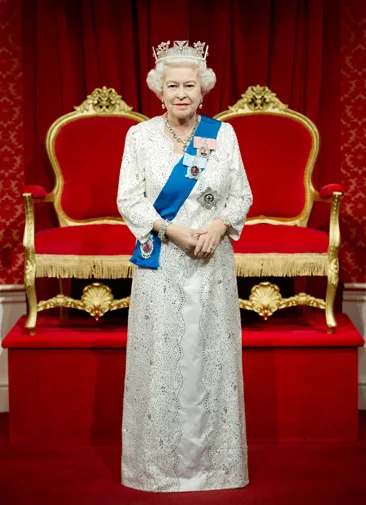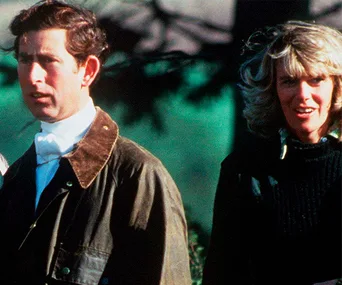First-born? Piggy in the middle? Or always the baby? Clinical psychologist Linda Blair reveals how birth order in the family can affect every aspect of your life.
From the moment you first draw breath, a number of factors are at work to shape your character. Unravelling all of them would be a major undertaking. However, there is one tantalisingly simple means of developing a profound understanding of yourself and other people – and it all comes down to the position you hold in your family.
Birth order, put into its proper context, is the key that can unlock personalities and give you a new perspective on human nature. This applies even to someone you’ve just met.Knowing whether a person is the eldest, youngest, middle or only child means you can instantly make a great number of correct guesses about the way the person behaves, thinks and feels.
But understanding the effects of birth order (or, if you are adopted, your place in the family) will also give you a new insight into your own personality. Having older or younger siblings, for example – or being an only child – exercises a profound influence on our emotions, outlook and behaviour.
After working as a clinical psychologist for 25 years, I’ve seen how these factors affect every aspect of our lives, from our careers to our relationships. So, let’s take a closer look at the various birth order positions. Depending on where you fit into your family, you’ll recognise many of the characteristics here as your own.
THE FIRST-BORN
Thirsty for approval
When you were a baby, you enjoyed the exclusive attention of your parents. However, probably within the first four years of your life, you had to start sharing this attention with a new child. That means you experienced the loss of your parents’ undivided focus before your own sense of security was firmly established.
As a result, your thirst for approval will probably always feel as if it can’t be quenched. In other words, no matter how much praise or adoration you receive, you’re likely to find yourself wanting more.
Another common consequence of losing some of your parents’ attention is to widen your search for adult praise and approval. Before long, you want to please anyone who occupies a position of power – because anyone in power is, in effect, a parental figure.
You will also remain liable to feeling easily hurt by any criticism levelled at you by an authority figure. Why? Because a criticism can feel like a rejection – so it’s likely to trigger your underlying anxiety about being supplanted by someone else.
Law-abiding and conservative
If you’re keen to please those in authority, it follows you’ll accept the rules they’ve set and identify with their values. You’re less likely to break the law. You also tend to be conservative in your outlook, sticking with what you know rather than taking chances with new schemes and ideas.
Keen to be in charge
Not only do you admire those in power, but you may well want to assume power yourself. Indeed, a disproportionate number of first-borns are in leadership positions. For example, more presidents, prime ministers and company chief executives have been first-borns than would be expected statistically.
Academically successful
You’re a good student: you do your homework and generally accept what authority figures tell you. Primarily, you are driven by the desire to please your parents and teachers (though you may later become fascinated by a subject in its own right). Another reason first-borns do well at school is that they tend to have superior language skills – a result of the extra attention you had from your parents before your siblings arrived.
Organised and responsible
As a first-born, you’ve watched your parents and other carers look after your younger siblings. No doubt you were also given opportunities to help out. All this practice and observation has not only made you nurturing and caring, but also given you organisational skills that make others want to put you in control. Furthermore, because you’re used to expecting that others will need your help, you’re usually the first person to volunteer when there is work to be done.
Self-critical
Your deep-seated fear of rejection means you dread failure. And because you ask so much of yourself, you’re less likely to forgive yourself when you don’t manage to do what’s expected. This tendency towards harsh self-criticism is particularly true if the sibling who comes next was born quite soon after you – that is, before you lost the belief that you were responsible for everything that happened in your life.
All children think in this way when they are very young: until they are about four or five, their first reaction when things go wrong is to assume responsibility. So although your memories of your sibling’s arrival may be hazy, you probably concluded then that your parents preferred the new baby because you were now less likeable.Many first-borns never lose this tendency to feel guilty or overly responsible when things go wrong.
Bad at delegating
You find it hard to delegate responsibility even if you’re overloaded and stressed. You instead prefer to stay in control. Indeed, you are afraid that if you lose that control, things may go wrong and that if they do, you will only have yourself to blame.
More likely to seek help
You are prone to suffering from anxiety and, in particular, feelings of insecurity and jealousy. This is partly because your parents were novices when you arrived. Babies are acutely sensitive to people’s moods, so there is a good chance that you were aware of their nervousness. Your anxiety is also a result of losing their exclusive focus on you while you were still very young. Feelings of displacement make a deep impression. How strong and lasting your problems will be depends on your temperament and how your parents handled the arrival of your new sibling. Consequently, you’re more likely to seek psychological help – not least because you tend to turn towards authority figures (such as a GP or psychologist) when you’re in distress.
THE MIDDLE-BORN
For families of more than three children, all those in between the first and last-born fall into this category. If the gap between you and the next child is more than three years, you will probably have some qualities that are typical of both a middle and a last-born.
Relaxed
By the time you came along, your parents were more relaxed and confident about what they were doing, so you were doubtless treated in a more matter-of-fact manner. This means you’re likely to be less of a worrier than your older sibling.
Diplomatic
You’re the co-operator and diplomat of the family. You manage to get on well with most people and to fit into any group, classroom or office. Above all, you are very sensitive to the needs and feelings of those around you
When others get locked into arguments, you are likely to be the one who tries to think of a way to sort things out. After all, that was your role more often than not in childhood. Sandwiched between younger and older siblings who wanted things done their own way, you tended to be the one to propose a compromise. Quite often, however, that compromise was at your own expense.
Easily persuaded
Having grown up surrounded by older and younger siblings, you have always gravitated toward people who are roughly your own age. So you are very sociable and attuned to your peers. However, you can be inclined simply to follow the crowd – and if your friends are trying to challenge authority or make mischief, that trait may land you in trouble.
Realistic
When you hung around with children the same age, you tended to compare yourself to them. As a result, the expectations you had for yourself were likely to be roughly appropriate for your stage of development. Even as a grown-up, you tend to remain realistic about your own talents and abilities.
Creative and sporty
Middle-borns nearly always focus their energies in areas where the first-born hasn’t been particularly successful. Look at it this way: your older and more capable sibling probably cornered the most common way of gaining parental approval – working hard at school – so you had to think of something else. The second choices most likely to please parents are sport and the arts. So the likelihood is that you channelled your interest into one or the other – or both.
First to leave home
It’s not clear why, but most middle-borns fly the nest relatively earlier than their siblings. Perhaps it is because you grew tired of always compromising and standing aside for the sake of others. Maybe you simply yielded to the youthful spirit of adventure because you were confident you could get along almost anywhere.
Champion of the underdog
Middle-borns put a lot of effort into keeping the social wheels greased. This is wonderful for everyone else, but, for you, there’s a cost. In the interests of social harmony, you are less likely to pay attention to your own needs and wishes. You may not even be sure what they are. Children who have had less time alone with their parents sometimes give up on their dreams because they feel the odds of realising them are small.
If you continually repress your own desires, they are pushed out of your mind. A sense of frustration remains, but you’re more likely to channel it into helping other people. Typically, you will single out a person or a group and assume that they’re troubled by the same problems as you are.
Whether you’re conscious of it or not, what you are saying is, in effect: “We all deserve equal treatment. I’m not going to overlook someone just because they’re not crying out for their needs to be met. I’m going to help them – just as I would have liked to be noticed and helped.”
Unconventional appearance
You’ve probably always had to be innovative to find ways of holding your parents’ attention. This may be why you are the one in the family who is most likely to dress bizarrely, to sport extreme hairstyles or wear unusual make-up – particularly during your teenage years. It’s the middle-born’s way of saying: “Hey, look at me! Come on, notice me!”
Lack of direction
Statistically, middle-borns are the least likely to seek psychological help. When they do, though, they most often have symptoms of depression or anxiety – such as tiredness, a lack of direction, panicky feelings and a sense of gloom about the future. Usually, my work with these middle-borns centres on helping them to discover their own passions and talents, as well as encouraging them to follow their dreams.
THE LAST-BORN
Dependent
Your parents probably decided before you were born that you would be their last child. Even so, they were likely to have feelings of nostalgia and regret. So, each of your “first” milestones became a significant “last time” for them. And because they weren’t quite ready to give up the parenting role, they tended to reward you when your behaviour was dependent or immature.
On top of this, you benefited from having more family members on hand to help you out whenever you asked, which means you probably never had to struggle with a problem on your own for very long. Plus, no new brother or sister ever came along to take away your role as the “baby” of the family. So you never really had any reason to give up you dependent, childish ways.
Outgoing and charming
Last-borns tend to be sociable creatures who enjoy being the centre of attention. It’s easy to understand why. Your older siblings captured your parents’ attention by being more mature and showing how well they could learn new skills. So you had to find another attractive way to shine.What you discovered is that attention-seeking antics play very well, particularly with parents who are already encouraging you to prolong your babyish behaviour.
Manipulative
Parents often deal with their last-born in an ambivalent manner. They want their youngest to be baby-like and sweet, yet not too much of a bother.This confusing message often causes the last-born to progress from behaving in a pleasantly attention-seeking way to becoming frustrated and manipulative.
Rather than become mature, the child learns how to “turn on the charm”. In its extreme form, this charm becomes outright manipulation. At that point, it is no longer attractive because it makes everyone around the manipulator feel overwhelmed and trapped.
Disorganised
Because you focus so much of your attention on what others can do for you, you are less likely to set goals for yourself. Furthermore, because you expect others to sort you out, you may never take the time to stop periodically to think about what you are doing. As a result, you quite often appear undirected or even chaotic.
Creative and innovative
Being disorganised isn’t all bad – in fact, it’s linked with creativity. Without carefully constructed plans, we’re often more open to new and different ways of thinking.The reason you have a tendency to be innovative and creative is that, as a child, you had no choice but to break new ground in the battle for your parents’ attention.
Rebellious
Risk-taker
Children will naturally test the limits set for them. Parents, though, tend to relax the boundaries with each successive child – which means that the last-born will have the least limits and therefore be liable to take the riskiest options.
Low self-esteem
During your childhood, everyone else in your family was bigger, stronger and more competent than you. After all, they had a head start. So when you compare yourself to your siblings, you are liable to feel inferior – or at least less competent. You are also in danger of concluding that it’s not worth trying to do things for yourself.
The longer people are taken care of – rather than encouraged to care for themselves – the higher the chance that they will feel let down by others in later life. This is a danger for last-borns. You grew up with an expectation that other people, particularly parental figures, would automatically “know” what you wanted and be keen to provide it.
But when you began to mix with your peers, you may have been surprised and even hurt to discover that they expected a more even-handed relationship. Thus you were left feeling let down and disappointed.A dangerous consequence of this is that, in adulthood, you may start blaming everyone else when things don’t go your way.
THE ONLY CHILD
Most single children are born to parents who choose to have a one-child family. If, however, your parents were desperate to have a large family, they’re likely to have spoiled and over-protected you. In adulthood, this may lead you to be perpetually dissatisfied and always expecting others to do everything for you.
Academically successful
Like first-borns, you tend to do well at school because you are used to interacting with adults and can express yourself clearly.Also, because you don’t have any siblings, you are less likely to have suffered from anxious or jealous feelings – both of which can interfere with concentration and memory.
Self-confident
Barring any destabilising event – such as divorce or loss of a parent – only children are unlikely to lose the fond and exclusive attention of either parent. Quite the contrary, you are often showered with love and approval. Therefore, you almost certainly developed a healthy level of self-confidence. If you had too much praise, though, it may have led to you feeling pressured.
And, if your mother and father focused too much attention on you, then you may have felt over-protected and trapped, as though you were living for them rather than for yourself. In my own clinical experience, though, most parents of singles seem to get the balance right and raise confident, assertive individuals.
Happy alone
Unlike children with siblings, you are used to finding ways of entertaining yourself. This can be a great plus because you are less prone than others to feel anxious if no one is around.
Logical and organised
Unlike children, most grown-ups know when it is advisable to repress their emotions and behave logically. Having grown up around adults, you learned this lesson early. After all, you never had to put up with siblings who threw tantrums or stirred up negative emotions – such as jealousy or anxiety. Your sensible, unemotional problem-solving skills were likely, therefore, to develop powerfully. You are probably good at planning ahead, making lists and organising yourself, and so you are also very often asked to take on positions of responsibility because of this.
Not street-smart
Although parents of single children usually make enormous efforts to provide their child with opportunities to socialise with their peers, these sessions are likely to be planned, time-limited and supervised by adults.The downside is that you seldom learn how to establish your “territory” – to stand up for yourself diplomatically and to find ways of sharing limited toys and space.
So singles often miss out entirely on opportunities to develop “street-smart” skills – whereas children with siblings learn to speed-read other people’s desires and intended actions (and to take advantage of that knowledge). Consequently, you are more likely than others to behave in ways that lead to misunderstandings. You can also feel distanced from your peers and awkward when you try to join in group activities.
Perfectionist
As a child, you tended to set your own standards in relation to adults. This means that you will almost certainly shoot high and expect a great deal of yourself.There is nothing wrong with that, but it’s also important to know how and when to relax to avoid problems. Otherwise, the perfectionist only-child will be prone to burnout and other disorders.
Afraid of disorder
In larger families, someone is always knocking over someone else’s carefully arranged set of blocks, so siblings have plenty of opportunities to figure out what to do when things go wrong and then mediate among themselves.
That wasn’t the case for you. When you had a problem, there was usually an adult to help you to sort it out. So you probably grew up with little experience of how to cope with disorder and confusion. Therefore, you can appear to be impatient or demanding when things don’t go according to your plan. In fact, my clinicial experience suggests that only children are also more prone than others to obsessive behaviour – the need to keep everything precisely in order.
Copyright 2011 Linda Blair, extracted from Birth Order: What Your Position In The Family Really Tells You About Your Character by Linda Blair, published by Piatkus, $35.
Your say: Do you think all only children are perfectionists?
Newsletter conversion description. Get the latest in your inbox.




















.jpg?resize=380%2C285)
.png?resize=380%2C285)





.jpg?resize=380%2C285)


























.jpg?resize=380%2C285)












































